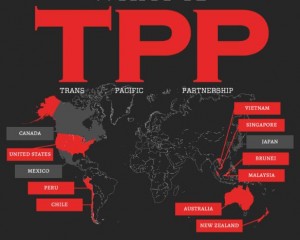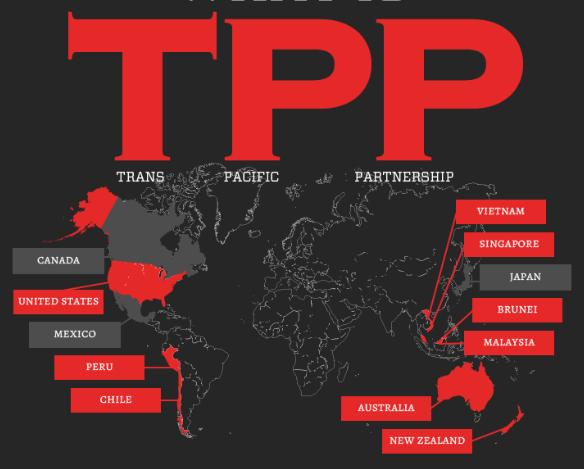 The Trans-Pacific Partnership, a proposed 12 nation free trade agreement that’s been nicknamed “NAFTA on steroids” between the US, Canada, Japan and others, has the American left – if not mainstream America yet – on high alert for two reasons.
The Trans-Pacific Partnership, a proposed 12 nation free trade agreement that’s been nicknamed “NAFTA on steroids” between the US, Canada, Japan and others, has the American left – if not mainstream America yet – on high alert for two reasons.
One reason is that so-called “free trade” agreements and organizations like the TPP, NAFTA and the WTO benefit big business rather than regular Americans.
“Global health advocates, environmentalists, Internet activists and trade unions have deep concerns about what the deal might contain, and are making as much noise as possible in order to influence negotiations before a final version becomes public,” according to a Washington Post Wonkblog post from December.
And the other reason is that the final version could win congressional approval without ever becoming public. President Obama has been seeking what is called “fast track authority” which would stifle lawmakers ability to amend the deal.
That’s why Congressmen David Cicilline and Jim Langevin, along with 150 House Democrats, signed a letter saying the TPP it should not be fast tracked.
“I believe it is too important an issue for Congress to be bypassed with fast-track authority,” Langevin said in an email to RI Future. “The TPP is far-reaching, affecting economics, intellectual property, the environment, health care and so much more, and as such, it merits a transparent, measured discussion between the Administration and members of Congress.”
Added Congressman David Cicilline: “Using trade promotion authority to ‘fast track’ complex trade agreements restricts Congress’s ability to ensure trade policies are fair for American workers, businesses, intellectual property holders, and consumers. Congress should have a say in crafting trade agreements, which impact U.S. workers and our economy.”
While details of the TPP are still shrouded in secrecy, there is some evidence that the free trade agreement could have a particular impact on an industry important to Rhode Island’s economy. According to the International Business Times (emphasis mine): “The U.S. has its own issues about opening up certain industries, too, such as removing sugar import tariffs and quotas that would harm American sugar beet farmers. The U.S. is also facing the sensitive prospect of inflicting harm on domestic textile and seafood producers in the negotiating process.”
But the Left in general fears the deal because, like NAFTA, it could put American workers in peril and would probably have adverse effects on environmental protections as well. According to the Economist: The “21st-century” aspects of TPP are “behind-the-border” issues, such as intellectual-property protection, environmental and labour standards, the privileges of state-owned enterprises and government-procurement practices. All are problematic.”
And then there are the provisions of the TPP that should raise ire in every American. According to the Electronic Frontier Foundation: “Leaked draft texts of the agreement show that the [intellectual property] chapter would have extensive negative ramifications for users’ freedom of speech, right to privacy and due process, and hinder peoples’ abilities to innovate.”

